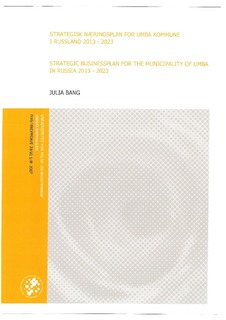| dc.description.abstract | Umba kommune, som er en distriktskommune på Kolahalvøya i Russland, står fremfor store utfordringer. Det er kraftig tilbakegang i folketall, stor arbeidsledighet, lav levestandard og mangelfull infrastruktur. De fleste næringer i kommunen har enten blitt lagt ned eller redusert sin virksomhet til det minimale etter kollaps av Sovjetunionen. Kommuneøkonomi er sårbar.
Dagens situasjon kan karakteriseres med mangel på tiltaksarbeid i kommunen og høy grad av sentral styring. De største bedrifter som er igjen eies og drives av de offentlige. Grunnen til dette er negative erfaringer fra privatisering av bedrifter på 90 – tallet i forrige århundre og manglende kunnskap om markedsøkonomi. De offentlige forsøker å opprettholde de arbeidsplasser som er igjen og sikre noe produksjon i kommunen.
Hovedplan som ligger til grunn for kommunal styring i Umba kommune er veldig omfattende, men er lite praktisk orientert for næringslivet. Denne er utarbeidet med bakgrunn i føringer fra Murmansk fylke. Næringslivet har derimot et behov for et dokument som gir signaler om kommunes målsettinger når det gjelder utviklingen fremover og konkrete tiltak som vil fjerne hindringer for næringslivsutvikling.
Når dagens situasjon for næringslivet i Umba kommune skulle oppsummeres, var det raskt gjort å grave seg ned i alle indikatorer som går i feil retning. I denne oppgaven ble det valgt å fokusere på at kommunen har alle forutsetninger til nå sin visjon som ble satt i denne oppgaven: ”Umba kommune skal ved bærekraftig vekst og kvalitativ utvikling fremstå som den mest attraktive kommunen i Murmansk fylke for å bosette seg i og etablere næringsvirksomhet”. Det er selvfølgelig et glimrende utgangspunkt for å lage en strategi for næringsutvikling.
I denne oppgaven har jeg tatt for meg utarbeidelse av strategisk næringsplan for Umba kommune for 10-års periode. Jeg tok utgangspunkt i det potensialet som finnes i kommunen i form av kulturhistoriske arv, unike pomor tradisjoner og varierte naturressurser. Studie av næringslivet med fokus på dagens status, spesielle fortrinn og hindringer, førte til at fire næringer har blitt prioritert: reiseliv og kultur, landbruk, fiskenæring og utmarksnæring. Definisjon av næringslivets behov for offentlig støtte dannet grunnlag for handlingsprogrammet med valg av konkrete målsettinger og identifikasjon av innsatsområder med tilhørende tiltak.
Denne masteroppgaven ble gjennomført som en case - studie. De funnene som gjort under arbeidet med strategisk næringsplan for Umba kommune kan videreføres også på andre distriktskommuner i tidligere Sovjetunionen.
Abstract
Umba municipality, a district municipality in the Kola Peninsula in Russia, standing before great challenges. It's sharp decline in population, high unemployment, low living standards and inadequate infrastructure. Most industries in the municipality have either been closed or reduced their activities to a minimum after the collapse of the Soviet Union. Municipal economy is vulnerable.
The current situation can be characterized by a lack of initiatives in the community and a high degree of central control. The largest companies that remain is owned and operated by the government. The reason for this is the negative experiences of privatization of companies in the 90’s of the last century and a lack of knowledge of the market economy. The government is trying to maintain the jobs that are left and make some production in the municipality.
Overall plan as the basis for municipal governance in Umba municipality is very extensive, but little practical oriented for businesses. This has been prepared on the basis of guidance from the Murmansk region. The private sector has, however, a need for a document that signals municipal objectives concerning future developments and specific actions that will remove obstacles to private sector development.
When the current situation of the sector in Umba municipality was summarized, it was quickly made to dig into all the indicators moving in the wrong direction. In this thesis, I have chosen to focus on the municipality have all the prerequisites to achieve its vision that was put into this task: "Umba municipality shall by sustainable growth and qualitative development emerge as the most attractive municipality in the Murmansk region to settle and establish businesses in." There is of course an excellent starting point for creating a strategy for economic development.
In this thesis I have studied the preparation of a strategic business plan for Umba municipality for 10-year period. I started with the potential of the municipality in terms of cultural and historical heritage, unique traditions pomor and varied natural resources. Study of business with a focus on current status, special advantages and obstacles, resulted in four industries were given priority: tourism and culture, agriculture, fishing industry and outlying. Definition of the needs for public support formed the basis for action by the choice of specific objectives and identification of priority areas and associated measures.
This master thesis was conducted as a case - study. The findings made during the process of strategic business for Umba municipality can also benefit other rural municipalities in the former Soviet Union. | no_NO |
